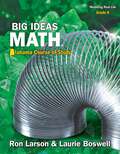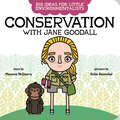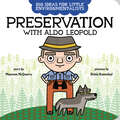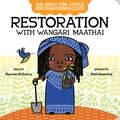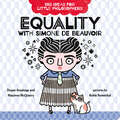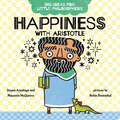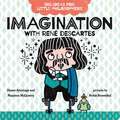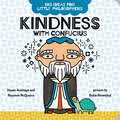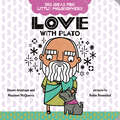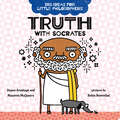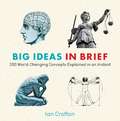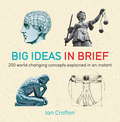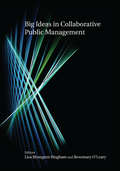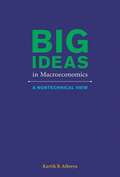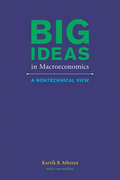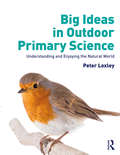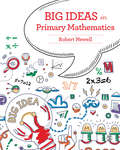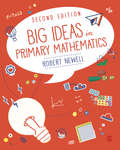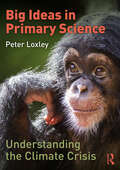- Table View
- List View
Big Ideas Math: Modeling Real Life, Grade K, Volume 1
by Ron Larson Laurie BoswellNIMAC-sourced textbook
Big Ideas Math: Modeling Real Life, Grade K, Volume 2
by Ron Larson Laurie BoswellNIMAC-sourced textbook
Big Ideas for Growing Mathematicians: Exploring Elementary Math with 20 Ready-to-Go Activities
by Ann KajanderIntroducing sophisticated mathematical ideas like fractals and infinity, these hands-on activity books present concepts to children using interactive and comprehensible methods. With intriguing projects that cover a wide range of math content and skills, these are ideal resources for elementary school mathematics enrichment programs, regular classroom instruction, and home-school programs. Reproducible activity sheets lead students through a process of engaged inquiry with plenty of helpful tips along the way. A list of useful terms specific to each activity encourages teachers and parents to introduce students to the vocabulary of math. This second Big Ideas book covers more advanced concepts, with projects including "One in a Million," where children use grains of rice to model the probability of astronomical odds; "Triangular Tessellations," in which students investigate the geometry and variations created by repeating patterns; and "Fractions of Salaries," where kids use a real-world scenario to multiply and divide fractions.
Big Ideas for Little Environmentalists: Conservation with Jane Goodall (Big Ideas for Little Environmentalists)
by Maureen McQuerryDiscover Jane Goodall's big ideas about conserving habitats and ways even the youngest kids can help, too! Even little children can make a positive impact on the environment. Jane Goodall has dedicated her life to studying chimpanzees, and realized that sometimes people hurt the places where animals have always lived. She began to teach others how we can enjoy nature while also making sure that the homes of animals aren&’t suffering. Kids will come away from this book with questions about what animal habitats they can care for in their own community, and how conservation work makes sure all people and animals have a healthy home. Look for the other books in the Big Ideas for Little Environmentalists series: Restoration with Wangari Maathai, Preservation with Aldo Leopold, and Ecosystems with Rachel Carson.
Big Ideas for Little Environmentalists: Preservation with Aldo Leopold (Big Ideas for Little Environmentalists)
by Maureen McQuerryDiscover Aldo Leopold's big ideas about preserving nature and ways even the youngest kids can help, too!Little children can make a big impact on the environment. Aldo Leopold transformed his childhood love for nature into a life dedicated to protecting and preserving the environment. He encouraged the idea of keeping wilderness areas untouched, so that all people could visit areas free of human interference. Kids will come away from this book excited about the nature they have access to and how to help preserve other wilderness areas. Look for all of the books in the Big Ideas for Little Environmentalists series: Conservation with Jane Goodall, Restoration with Wangari Maathai, and Ecosystems with Rachel Carson.
Big Ideas for Little Environmentalists: Restoration with Wangari Maathai (Big Ideas for Little Environmentalists)
by Maureen McQuerryDiscover Wangari Maathai's big ideas about restoring nature and ways even the youngest kids can help, too! Even little children can make a positive impact on the environment. Wangari Maathai grew up in Kenya, and her childhood was spent playing beneath mugumo fig trees. Over time, most of the trees in her area were cleared and she noticed how that made many people and animals suffer. Wangaari realized that trees are important for the health of the land and all who live on it, so she worked to plant millions of trees to make the land healthy again. Kids will begin to see through Wangaari that it is never too late to help restore damaged land back to what it once was, and they can help their community take care of struggling environments. Look for all of the books in the Big Ideas for Little Environmentalists series: Conservation with Jane Goodall, Preservation with Aldo Leopold, and Ecosystems with Rachel Carson.
Big Ideas for Little Philosophers: Equality with Simone de Beauvoir (Big Ideas for Little Philosophers #1)
by Duane Armitage Maureen McQuerryExplore the importance of equality with the youngest readers in a wonderfully accessible way.Even little children have big questions about life. Simone de Beauvoir focused much of her work on the concept of equality, insisting that girls and boys and women and men should have the same opportunities to be happy. Everyone should have the right to be themselves and be treated with respect no matter what. Kids will come away from this book encouraged to think about how the same things can make girls and boys happy or sad or excited, and everyone should listen to who they are on the inside and respect that in others.Look for all six Big Ideas for Little Philosophers board books: Equality with Simone de Beauvoir, Truth with Socrates, Happiness with Aristotle, Imagination with René Descartes, Kindness with Confucius, Love with Plato, and Truth with Socrates.
Big Ideas for Little Philosophers: Happiness with Aristotle (Big Ideas for Little Philosophers #2)
by Duane Armitage Maureen McQuerryExplore the importance of happiness with the youngest readers in a wonderfully accessible way.Even little children have big questions about life. Finding happiness is a lifelong goal and Aristotle thought deeply about it. Why are we here? What is the best way to live a happy life? Having friends who are fun and adventurous is important, but it's also important to have true friends who will help us be good people and tell us when we're straying from that. He also believed we have to love ourselves in order to love others and be happy. This book will prompt readers to concentrate on what makes them happy and how they can be a good friend to others and themselves.Look for all six Big Ideas for Little Philosophers board books: Equality with Simone de Beauvoir, Truth with Socrates, Happiness with Aristotle, Imagination with René Descartes, Kindness with Confucius, Love with Plato, and Truth with Socrates.
Big Ideas for Little Philosophers: Imagination with René Descartes (Big Ideas for Little Philosophers #3)
by Duane Armitage Maureen McQuerryExplore the importance of imagination with the youngest readers in a wonderfully accessible way. Even little children have big questions about life. Imaginations are unique to every human on earth and René Descartes believed that is what makes every person their own true self. By thinking about what we imagine and how all people imagine differently, kids can work on understanding others' perspectives and points of view and become more empathetic. Imagination with René Descartes will help them see how using your imagination makes you "you" and understanding the same about friends and family is an important part of getting along in a community.Look for all six Big Ideas for Little Philosophers board books: Equality with Simone de Beauvoir, Truth with Socrates, Happiness with Aristotle, Imagination with René Descartes, Kindness with Confucius, Love with Plato, and Truth with Socrates.
Big Ideas for Little Philosophers: Kindness with Confucius (Big Ideas for Little Philosophers #5)
by Duane Armitage Maureen McQuerryExplore the importance of kindness with the youngest readers in a wonderfully accessible way.Even little children have big questions about life. Confucius believed always treating people with kindness can make us wise, and Kindness with Confucius brings his philosophy to the youngest thinkers. He believed we should use our own feelings as a guide to how to treat others. We feel good when people are kind to us and should want to make others feel that way. Emphasizing the importance of being in touch with your own emotions in order to be kind to others, this book will lead to inspiring conversations about human dynamics between people of all ages.Look for all six Big Ideas for Little Philosophers board books: Equality with Simone de Beauvoir, Happiness with Aristotle, Imagination with René Descartes, Kindness with Confucius, Love with Plato, and Truth with Socrates.
Big Ideas for Little Philosophers: Love with Plato (Big Ideas for Little Philosophers #6)
by Duane Armitage Maureen McQuerryExplore the importance of love with the youngest readers in a wonderfully accessible way.Even little children have big questions about life. Plato believed showing and receiving love makes us wise, and Love with Plato brings his philosophy to the youngest thinkers. Asking young readers what being loved feels like to them and how they can show others love prompts questions about how we treat one another and ourselves. This book will lead to inspiring conversations about loving people for what is on the inside, and helping others do the same.Look for all six Big Ideas for Little Philosophers board books: Equality with Simone de Beauvoir, Happiness with Aristotle,Imagination with René Descartes, Kindness with Confucius, Love with Plato, and Truth with Socrates.
Big Ideas for Little Philosophers: Truth with Socrates (Big Ideas for Little Philosophers #4)
by Duane Armitage Maureen McQuerryExplore the importance of truth with the youngest readers in a wonderfully accessible way.Even little children have big questions about life. Socrates believed being truthful and asking questions about the world can make us wise, and Truth with Socrates brings his philosophy to the youngest thinkers. From the importance of being honest even if it's hard or makes you scared to always asking questions to understand more about everything around you, this book will lead to inspiring conversations about human dynamics between people of all ages.Look for all six Big Ideas for Little Philosophers board books: Equality with Simone de Beauvoir, Truth with Socrates, Happiness with Aristotle, Imagination with René Descartes, Kindness with Confucius, Love with Plato, and Truth with Socrates.
Big Ideas for Small Mathematicians: Kids Discovering the Beauty of Math with 22 Ready-to-Go Activities
by Ann KajanderIntroducing sophisticated mathematical ideas like fractals and infinity, these hands-on activity books present concepts to children using interactive and comprehensible methods. With intriguing projects that cover a wide range of math content and skills, these are ideal resources for elementary school mathematics enrichment programs, regular classroom instruction, and home-school programs. Reproducible activity sheets lead students through a process of engaged inquiry with plenty of helpful tips along the way. A list of useful terms specific to each activity encourages teachers and parents to introduce students to the vocabulary of math. Projects in this first of the two Big Ideas books include "Straw Structures," where children get hands-on experience with measurement and 3-D visualization; "Kaleidoscopes," in which students use geometry to build a mathematical toy; and "Crawling Around the Möbius Strip," where kids build a physical example of infinity.
Big Ideas in Brief
by Ian CroftonBig Ideas in Brief provides an accessible and easily understood tour of 200 key concepts that really matter. The ideas covered come from a wide range of subjects-Philosophy, Religion, Politics, Economics, Sociology, Anthropology, Psychology, the Arts, and Science.A series of short and lively articles comprising a maximum of 200 words, accompanied by 100 illustrations, introduces a host of diverse topics, from Existentialism to Expressionism, from Consciousness to Constitutionalism, from Feminism to Free Trade, from Class to Cognitive Theory, from Reincarnation to Relativity-all explained simply and clearly.From the Trade Paperback edition.
Big Ideas in Brief: 200 World-Changing Concepts Explained In An Instant
by Ian CroftonBig Ideas in Brief provides an accessible and easily understood tour of 200 key concepts that really matter. The ideas covered come from a wide range of subjects - Philosophy, Religion, Science, Politics, Economics, Sociology, Anthropology, Psychology and the Arts. A series of short and lively articles accompanied by 100 illustrations introduce a host of diverse topics, all explained simply and clearly.
Big Ideas in Brief: 200 World-Changing Concepts Explained In An Instant (IN MINUTES)
by Ian CroftonBig Ideas in Brief provides an accessible and easily understood tour of 200 key concepts that really matter. The ideas covered come from a wide range of subjects - Philosophy, Religion, Science, Politics, Economics, Sociology, Anthropology, Psychology and the Arts. A series of short and lively articles accompanied by 100 illustrations introduce a host of diverse topics, all explained simply and clearly.
Big Ideas in Collaborative Public Management
by Rosemary O'Leary Lisa Blomgren BinghamThe world of public management is changing dramatically, fueled by technological innovations such as the Internet, globalism that permits us to outsource functions anywhere in the world, new ideas from network theory, and more. Public managers no longer are unitary leaders of unitary organizations - instead, they often find themselves convening, negotiating, mediating, and collaborating across borders."Big Ideas in Collaborative Public Management" brings together a rich variety of big picture perspectives on collaborative public management. The chapters are all original and written by distinguished experts. Designed for practical application, they range from examinations of under what conditions collaborative public management occurs to what it means to be a collaborative leader.The contributors address tough issues such as legitimacy building in networks, and discuss ways to engage citizens in collaboration. They examine the design of collaborative networks and the outcomes of collaboration. Detailed introductory and concluding chapters by the editors summarize and critique the chapters, and frame them as a reflection of the state of collaborative public management today.
Big Ideas in Macroeconomics
by Kartik B. AthreyaMacroeconomists have been caricatured either as credulous savants in love with the beauty of their mathematical models or as free-market fundamentalists who admit no doubt as to the market's wisdom. In this book, Kartik Athreya draws a truer picture, offering a nontechnical description of prominent ideas and models in macroeconomics, arguing for their value as interpretive tools as well as their policy relevance. Athreya deliberately leaves out the technical machinery, providing students new to modern macroeconomics as well as readers with no formal training in economics or mathematics -- including economic writers and policymakers -- with an essential guide to the sometimes abstract ideas that drive macroeconomists' research and practical policy advice.Athreya describes the main approach to macroeconomic model construction, the foundational Walrasian general equilibrium framework, and its modern version, the Arrow-Debreu-McKenzie (ADM) model. He then explains the reasons for the relevance of this model for interpreting real-world outcomes, and lays out the so-called Fundamental Theorems of Welfare Economics. In the heart of the book, Athreya shows how the Walrasian approach shapes and unifies much of modern macroeconomics. He details models central to ongoing macroeconomic analyses: the neoclassical and stochastic growth models, the standard incomplete-markets model, the overlapping-generations model, and the standard search model. Athreya's accessible primer traces the links between the views and policy advice of modern macroeconomists and their shared theoretical approach.
Big Ideas in Macroeconomics: A Nontechnical View (The\mit Press Ser.)
by Kartik B. AthreyaAn accessible description of modern macroeconomics, and a defense of its policy relevance.Macroeconomists have been caricatured either as credulous savants in love with the beauty of their mathematical models or as free-market fundamentalists who admit no doubt as to the market's wisdom. In this book, Kartik Athreya draws a truer picture, offering a nontechnical description of prominent ideas and models in macroeconomics, and arguing for their value as interpretive tools as well as their policy relevance. Athreya deliberately leaves out the technical machinery, providing an essential guide to the sometimes abstract ideas that drive macroeconomists' research and practical policy advice.Athreya describes the main approach to macroeconomic model construction, the foundational Walrasian general-equilibrium framework, and its modern version, the Arrow-Debreu-McKenzie (ADM) model. In the heart of the book, Athreya shows how the Walrasian approach shapes and unifies much of modern macroeconomics. He details models central to ongoing macroeconomic analyses: the neoclassical and stochastic growth models, the standard incomplete-markets model, the overlapping-generations model, and the standard search model. Athreya's accessible primer traces the links between the views and policy advice of modern macroeconomists and their shared theoretical approach.
Big Ideas in Outdoor Primary Science: Understanding and Enjoying the Natural World
by Peter LoxleyBig Ideas in Outdoor Primary Science takes a fresh approach to learning science in outdoor contexts. It combines new thinking in science teaching using big ideas, with our growing need to look after our planet, and encourages children to learn from what scientists have to say about issues which will impact their lives today and in the future. The book offers primary teachers the subject and pedagogical knowledge, as well as the confidence they need, to integrate the seeds of big ideas into their curriculum. To this end, it provides models of good practice which exemplify how primary-aged children can work towards understanding some of science’s big ideas and engage with important issues related to wildlife conservation. The easy-to-use book covers topics such as: Interdependence Adaptation Inheritance Following in Darwin’s footsteps Protecting ecosystems Full of ideas for outside learning, this book is a comprehensive, valuable and essential resource for all teachers of primary science.
Big Ideas in Primary Mathematics
by Robert NewellLightbulb moments for your and you pupils This book explores the 'big ideas' in maths to help trainee teachers confidently teach the curriculum in a way that engages children and focuses on understanding, rather than memory, for those lightbulb moments. Covering the major concepts in simple terms, whilst carefully linking to the National Curriculum, it shows how they can be used to enable learning and support mathematical mastery. A focus on explaining misconceptions and errors will strengthen trainees and teachers own mathematical subject knowledge, while also giving them the confidence to deepen the understanding of the children they teach. Key topics include: · Problem-solving, reasoning and developing fluency in maths · Place value and counting systems · Measuring money, time, and weight · Geometry, and understanding space and shape · Fractions and statistics for the primary classroom This is essential reading for anyone studying primary mathematics on initial teacher education courses, including undergraduate (BEd, BA with QTS) and postgraduate (PGCE, PGDE, School Direct, SCITT) routes, and also NQTs. Robert Newell is a tutor in primary education at the UCL Institute of Education, London.
Big Ideas in Primary Mathematics
by Robert NewellLightbulb moments for you and your pupils This book explores the ‘big ideas’ in maths to help trainee teachers confidently teach the curriculum in a way that engages children and focuses on understanding, rather than memory, for those lightbulb moments. Covering the major concepts in simple terms, whilst carefully linking to the National Curriculum, it shows how they can be used to enable learning and support mathematical mastery. A focus on explaining misconceptions and errors will strengthen trainees and teachers own mathematical subject knowledge, while also giving them the confidence to deepen their understanding of the children they teach. Key topics include: Problem-solving, reasoning and developing fluency in maths Place value and counting systems Measuring money, time and weight Geometry, and understanding space and shape Fractions and statistics for the primary classroom This is essential reading for anyone studying primary mathematics on initial teacher education courses, including undergraduate (BEd, BA with QTS) and postgraduate (PGCE, PGDE, School Direct, SCITT) routes, and also NQTs. Robert Newell is a tutor in primary education at the UCL Institute of Education, London.
Big Ideas in Primary Mathematics
by Robert NewellThis book explains ‘big ideas’ in mathematics in simple terms supported by classroom examples to show how they can be applied in primary schools to enable learning. Carefully linked to the National Curriculum, it covers all the major concepts so you can develop your own mathematical subject knowledge and to give you the confidence to deepen your understanding of the children you teach. This second edition includes: · A new ‘links with mastery’ feature showing how to teach with mastery in mind · A new glossary of key terms · New big ideas and activities throughout
Big Ideas in Primary Mathematics
by Robert NewellThis book explains ‘big ideas’ in mathematics in simple terms supported by classroom examples to show how they can be applied in primary schools to enable learning. Carefully linked to the National Curriculum, it covers all the major concepts so you can develop your own mathematical subject knowledge and to give you the confidence to deepen your understanding of the children you teach. This second edition includes: · A new ‘links with mastery’ feature showing how to teach with mastery in mind · A new glossary of key terms · New big ideas and activities throughout
Big Ideas in Primary Science: Understanding the Climate Crisis
by Peter LoxleyBig Ideas in Primary Science: Understanding the Climate Crisis takes a fresh approach to learning the science of climate change. It combines new thinking in science teaching using big ideas, with our growing need to look after our planet, and encourages children to learn from what scientists have to say about issues that will impact their lives today and in the future. The book offers primary teachers the subject and pedagogical knowledge, as well as the confidence they need, to integrate the seeds of big ideas into their curriculum. It provides models of good practice which exemplify how primary-aged children can work towards understanding some of science’s big ideas and engage with important issues related to climate change. There are also opportunities for children to develop skills and understanding from other curriculum areas, such as geography, design technology, and art. The easy-to-use book covers topics such as: Weather Climate Climate change Impact of the climate crisis on our lives Impact of the climate crisis on wildlife The world we must create Taking climate action By making the ideas their own, children can develop informed ways of thinking about issues related to climate change and feel empowered to act in ways which can make a difference. Full of ideas about the climate crisis, Big Ideas in Primary Science is a comprehensive, valuable, and essential resource for all teachers of primary science.
